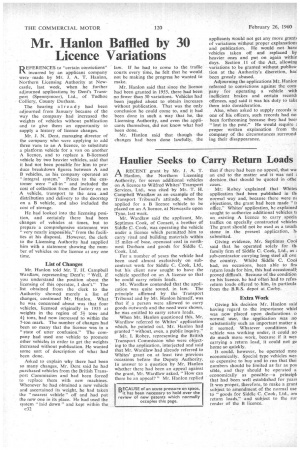Haulier Seeks to Carry Return Loads
Page 178

If you've noticed an error in this article please click here to report it so we can fix it.
rtA RECENT grant by Mr. J. A. T. Hanlon, the Northern Licensing Authority, for seven additional vehicles on A licence to Wilfred Whites' Transport Services, Ltd., was cited by Mr. T. H. Campbell Wardlaw as an example of the Transport Tribunal's attitude, when he applied for a B licence vehicle to be placed on an A licence, at Newcastle upon Tyne, last week.
Mr. Wardlaw said the applicant, Mr. Septimus Cook, of Con sett, a brother of Siddle C. Cook, was operating the vehicle under a licence which permitted him to carry road and building materials within 15 miles of base, opencast coal in northwest Durham and goods for Siddle C. Cook, Ltd.
For a number of years the vehicle had been used almost exclusively on subcontract work for Siddle C. Cook, Ltd., hut his client now sought to have the vehicle specified on an A licence so that he could carry remit loads.
Mr. Wardlaw contended that the application was quite sound, in law. The principle affirmed by the Transport Tribunal and by Mr. Hanlon himself, was that if a person were allowed to carry goods outwards and the need were shown, he was entitled to carry return toads.
When Mr. Hanlon questioned this, Mr. Wardlaw referred to Whites' application which, he pointed out, Mr. Hanlon had granted "without, even, a public inquiry."
Mr. I. Robey, representing the British Transport Commission 'who were objecting to the application, interjected and said that Mr. Wardlaw had already referred to Whites' grant on at least two previous occasions before the Deputy Authority. In answer to a auestion by Mr. Hanlon whether there had been an appeal against the grant, Mr. Wardlaw asked, "How can there be an appeal?" Mr. Hanlon replied
that if there had been no appeal, that wa: an end to the matter and it was not decision, that should be quoted in Ate cases.
Mr. Robey explained that Whites application had been published in ail normal way and, because there were n( objections, the grant had been made "is office." Whites' application, he explained sought to authorize additional vehicles t( an existing A licence to carry specia traffics on specially constructed vehicles The grant should not be used as a touch stone in the present application, hi submitted.
Giving evidence, Mr. Septimus Cool said that he operated solely for thi family firm of Siddle C. Cook, Ltd., as sub-contractor carrying long steel all ove the country. Whilst Siddle C. Cool had, on occasions, been able to find return loads for him, this had occasionall; proved difficult. Because of the condition on his licence, he had often had to refusi return loads offered to him, in particula from the B.R.S. depot at Corby.
Extra Work Giving his decision Mr. Hanlon said having regard to the importance whicl was now placed upon declarations o normal user, the application was no substantially such an important matter a it seemed. Whatever conditions tit, vehicle was working under, it could no do much more work, because if it wen carrying a return load, it could not ge home so quickly.
It could, however, be operated mor. economically. Special type vehicles wee. so expensive to buy and to run that thei numbers should be limited as far as pos sible, and they should be operated a economically as possible—a principli that had been well established for years It was proper, therefore, to make a granI subject to amendment of the normal use to "goods for Siddle C. Cook, Ltd., and return loads," and subject to the stir render of the B licence.
























































































































































































































